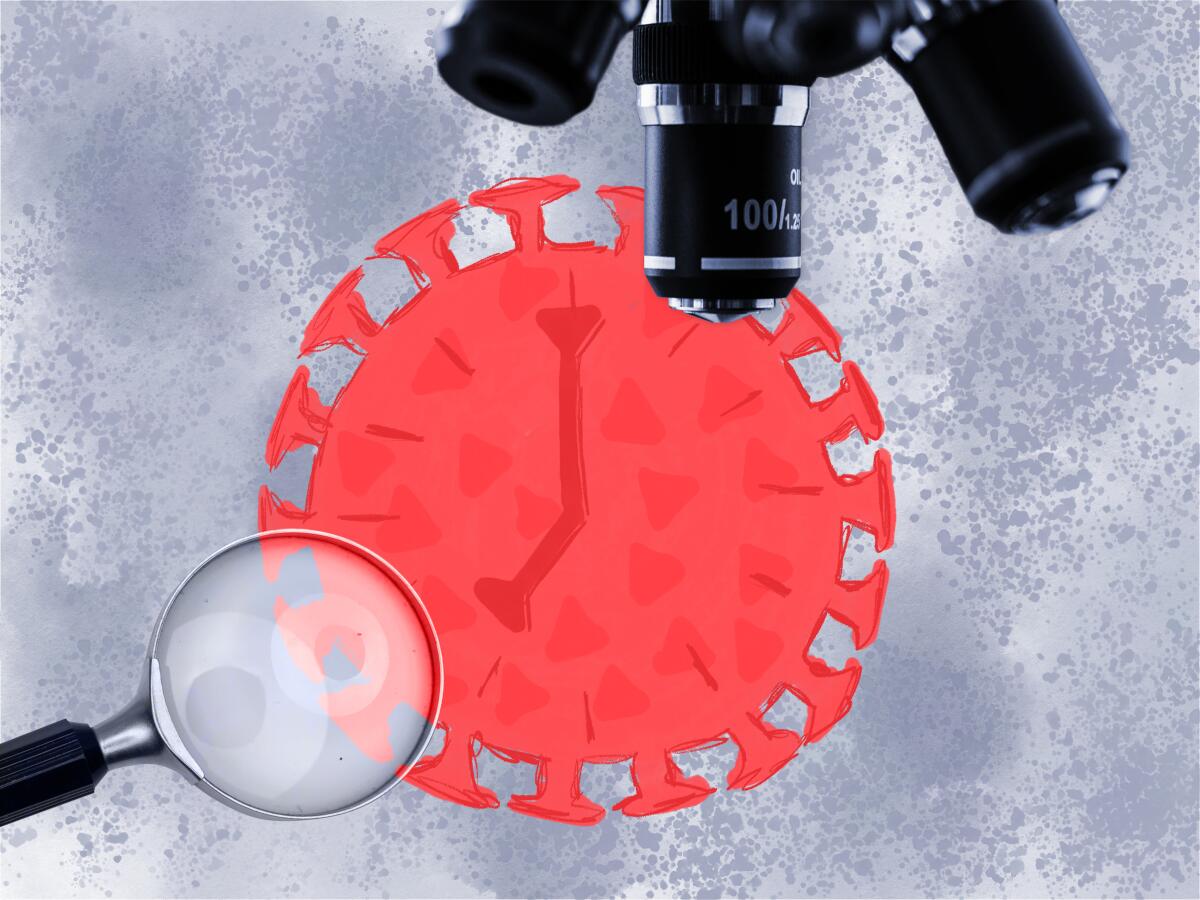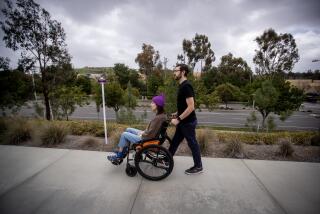Op-Ed: How long-haul COVID-19 could offer clues for treating other puzzling chronic illnesses

Shortly after the COVID-19 pandemic took hold, doctors began seeing puzzling symptoms in patients that lasted well beyond the initial infection period. These COVID-19 long-haulers suffered from distressing or debilitating problems months after supposedly recovering from the disease.
On a Facebook support page for long-haulers, one person who had developed extreme fatigue said: “It was like I was chained to my bed. It seemed impossible to even think about getting up.” Another with brain fog shared: “I was cleaning my gutters and forgot where I was and what I was doing on the roof.”
Between 40% and 75% of long-haulers describe a complex neurological constellation of symptoms and conditions. These include fatigue, intense headaches, muscle weakness, difficulty sleeping, anxiety, poor concentration, memory loss and changes to the sense of taste and smell. Most have three or more symptoms, which indicates that long-haul COVID-19 likely affects multiple parts of the brain or multiple organ systems at once.
Just as puzzling, many long-haulers never experienced severe COVID-19 or needed hospitalization. Comorbidities, such as obesity, diabetes and heart disease, do not appear to be causal factors. Seventy percent of long-haulers are women, although this may be because they are more likely than men to report symptoms. The young are also susceptible, another reason everyone should gain immunity by vaccination, not by infection. A study in China found that 75% of hospitalized COVID-19 patients after six months reported at least one long-haul symptom. The conservative estimate from many sources is that at least 10% of COVID-19-infected individuals experience long-haul symptoms.
We do not yet know what causes long-haul COVID-19 and why it differs from acute COVID-19. The virus may continue to infect internal organs even after it is no longer detectable in the blood, or it may trigger a long-term abnormal immune response that affects different organ systems in an ongoing manner.
Understanding and managing this complex disease requires new approaches, built on data and genetic analysis. In March 2020, the Institute for Systems Biology joined forces with Swedish Hospital in Seattle to launch a clinical study with 200 hospitalized COVID-19 patients.
Our aim was to assess the body’s immune response to the coronavirus through the course of the disease. We studied the patients’ blood at the time of hospital admission, 10 days later (near the peak of the typical COVID-19 immune response) and at three months, when immune responses should have typically returned to normal.
From each blood draw, we analyzed 5,000 white blood cells and quantified each cell’s complete gene expression patterns while also analyzing 250 cell-surface proteins and 40 secreted proteins. We categorized the white blood cells by type (T-cell, B-cell or natural killer cell) and determined each cell’s state of activation. We used these data to describe each person’s immune-response state at these three different stages of the disease.
We saw a number of different immune response trajectories in our patient population. For example, the immune systems of only one-third of patients returned to normal after three months. We are now starting another COVID-19 trial with 100 long-haul patients to assess whether different immune system abnormalities may cause different kinds of long-haul symptoms.
This kind of comprehensive immune analyses at the individual patient level may help answer fundamental questions, such as what are the mechanisms of COVID-19 disease, both acute and long-haul? What kinds of new medicines or therapies are needed? Is it possible to predict who is susceptible and provide treatment before severe symptoms develop?
One interesting effect recently observed is that some long-haulers who got vaccinated experienced rapid and complete remission of their symptoms. The percentage of those who respond positively to vaccination and the length of remission is unknown, but reports suggest that vaccination will be an important long-hauler treatment as well as a defense against COVID-19.
Understanding the immune system’s response to COVID-19 may even help us understand, diagnose and treat other complex chronic immune-related conditions. This could be particularly true with illnesses with neurological symptoms common to long-haul COVID-19.
For example, Lyme disease, caused by a bacterium, resolves in most patients after antibiotic treatment. But a fraction of patients will suffer long-term Lyme disease symptoms, which are similar to long-haul COVID-19 — pain, fatigue, or difficulty thinking that lasts for many months after treatment and for some people, years and perhaps a lifetime. Why some patients experience these symptoms post-treatment is not known and there is no treatment for such continuing symptoms.
Today, millions of people struggle with chronic conditions that may also be triggered by immune system abnormalities, whose origins are often unknown — including rheumatoid arthritis, multiple sclerosis, lupus, Lyme disease, chronic fatigue syndrome, Guillain-Barre syndrome and inflammatory bowel disease. Comprehensive immune analyses will almost certainly provide fundamental new insights into many of these diseases.
Unfortunately, most people with long-haul symptoms share at least one prominent experience: the difficulty in getting their conditions recognized, diagnosed and effectively treated. Physicians and insurers often deny patients’ reality and experiences when they present complex and seemingly unrelated symptoms and treat their conditions as psychosomatic. Not only does this demean the patient, but it exacerbates the worry, confusion and stress of patients and families dealing with significant mental and physical health challenges. This also delays treatment, adds to overall costs and diminishes productivity and quality of life.
Until now, we’ve lacked the science, resources and focus to make significant headway with these disparate diseases. This time is different. COVID-19 has already led to breakthroughs in vaccine development, forced greater healthcare coordination, encouraged widespread adoption of telemedicine and other digital tools and propelled the development of new techniques such as comprehensive immune-system analyses.
This new kind of analysis has the potential to advance understanding of disease mechanisms and accelerate holistic therapies for millions of long-haulers — and perhaps for people suffering from other chronic diseases as well.
Leroy Hood, a member of the National Academies of Sciences, Engineering and Medicine, is a professor and co-founder of the Institute for Systems Biology and senior vice president and chief science officer of the Providence St. Joseph Health system.
More to Read
A cure for the common opinion
Get thought-provoking perspectives with our weekly newsletter.
You may occasionally receive promotional content from the Los Angeles Times.










